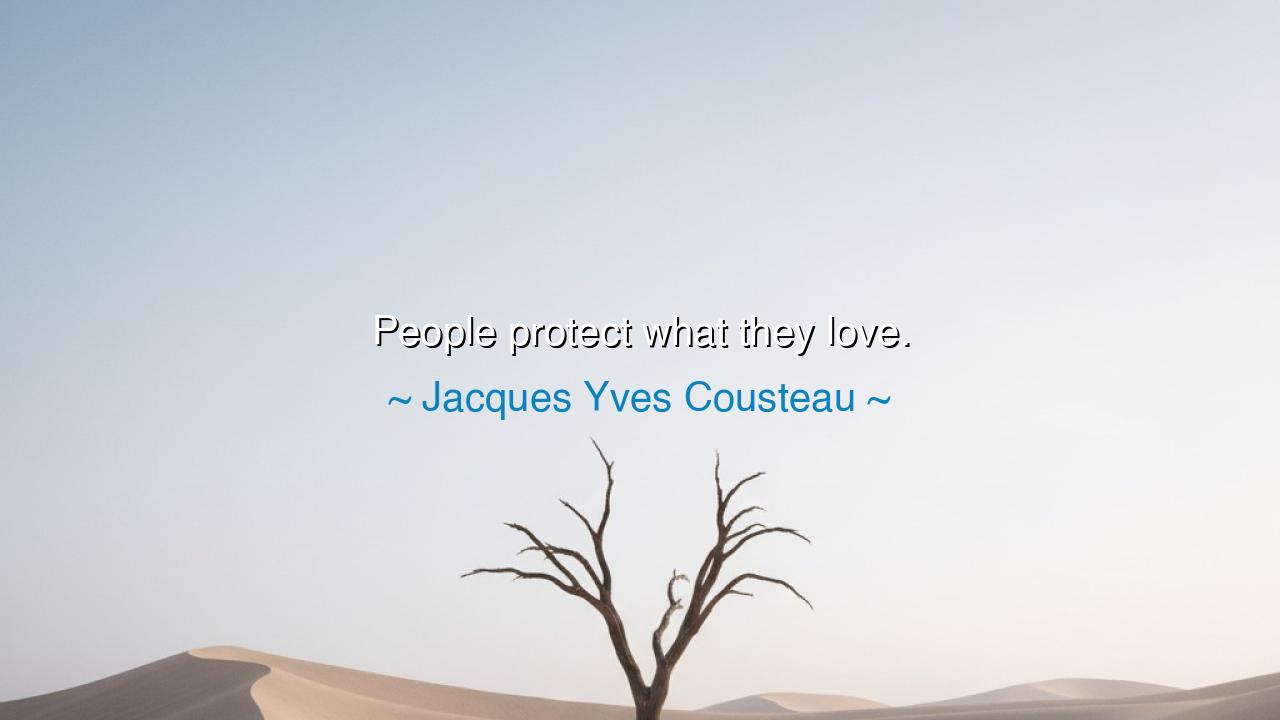
People protect what they love.






Jacques Yves Cousteau, the legendary explorer of the seas, once shared a profound insight: “People protect what they love.” These words carry the weight of human nature, revealing a universal truth about the bond between love and protection. Love is not a passive feeling; it is a force that compels action, that drives us to shield and safeguard the things we hold most dear. Whether it is a person, a place, or a cause, when we love something, we instinctively rise to protect it. This protective instinct is not born from duty alone, but from the deep connection that love fosters—when we love, we see the world differently, and we feel responsible for its well-being. This truth is timeless, and it resonates through the stories of the ancients, who understood that love and care are intertwined forces that shape the world.
In the ancient world, the gods themselves were often called upon to protect those they loved, whether it was Athena protecting the city of Athens or Apollo defending his beloved Daphne. These deities were not only figures of great power, but also symbols of the deep connection between love and protection. The gods watched over their devotees, not because it was their duty alone, but because their love for the world and its people moved them to act. Zeus, as the king of gods, wielded immense power, but it was his love for humanity that drove him to intervene in moments of great crisis. This connection between love and protection was at the core of the ancient Greek worldview—love spurred action, and action safeguarded what was loved.
Consider, O children, the story of Hercules, whose twelve labors were not just feats of strength but acts of protection. Each task he faced was a challenge that required him to protect the order and balance of the world. From slaying the Hydra to capturing the Golden Erymanthian Boar, Hercules was not merely acting out of self-interest; his deeds were motivated by a desire to protect the world from chaos and destruction. He loved his people, his land, and the honor of his gods, and so he gave his strength in service to their protection. Through his love for his kingdom and for the divine, Hercules became a symbol of how love compels us to act, to defend, and to preserve that which is precious.
In the modern world, we can look to the example of Rachel Carson, whose love for the natural world led her to fight against the dangers of pesticide use. In her book Silent Spring, Carson's deep affection for the environment drove her to protect it from the harmful effects of chemical pollutants. Her love for nature was not abstract—it was a love that compelled her to take action, to warn the world of the destructive consequences of human actions. Through her work, Carson changed the course of environmental history, proving that when we love something deeply, we feel compelled to protect it—not only for our own benefit but for the generations to come. Like the ancients, Carson’s love was not passive; it was a love that moved her to defend the earth, to ensure that it could continue to nourish life.
The lesson of Cousteau’s words rings clear: when we truly love, we are driven to protect. Love is not just an emotion; it is a call to action, a call to safeguard the fragile and precious things around us. This protection can take many forms—it can be the protection of human life, the preservation of culture, or the conservation of the environment. The act of protecting what we love is not just an expression of duty, but a manifestation of the depth of our connection to the world. When we love, we do not stand idly by; we rise to defend, to preserve, and to ensure that the things we cherish continue to thrive.
So, O children of the future, remember this: love deeply and you will find that you cannot help but protect that which you cherish. Whether it is your family, your community, or the world itself, the more you love, the more you will feel the urge to preserve and nurture. In your own lives, you will find countless opportunities to act in service to the things you hold dear. Protect your relationships, protect the earth, protect the truth, for these are the things that give life meaning. Love calls for action, and in this action, we fulfill the deepest purpose of our hearts.
Let this wisdom guide you in all things: love is not something that remains confined to the heart, but something that moves us to action, to change, and to growth. When we truly love, we become guardians—guardians of those things that nourish the soul, whether they be people, places, or ideals. Let love be the force that propels you forward, and let it shape the world you inhabit. Through love, we become protectors, not only of our own interests but of the greater good, and in this protection, we find the greatest fulfillment of all.






AAdministratorAdministrator
Welcome, honored guests. Please leave a comment, we will respond soon